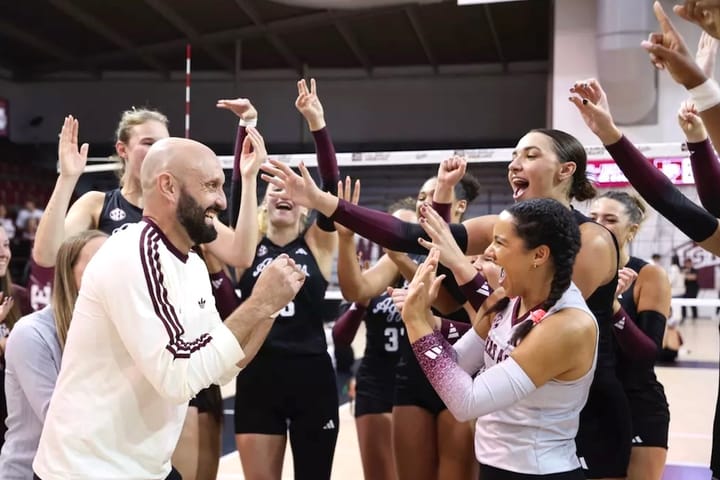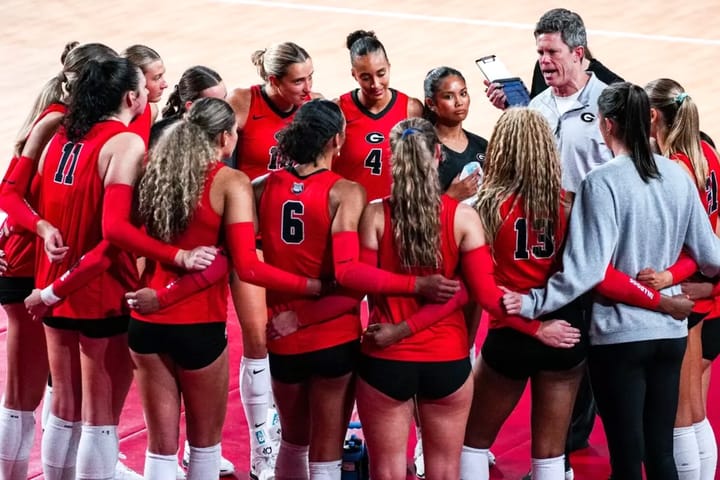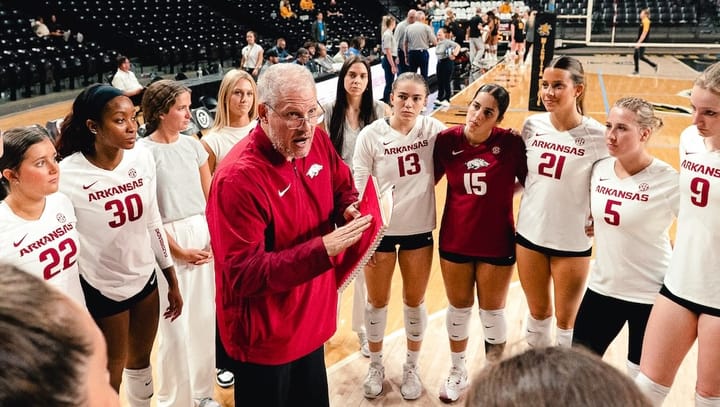2. John Cook: 'Be A Lifelong Learner'
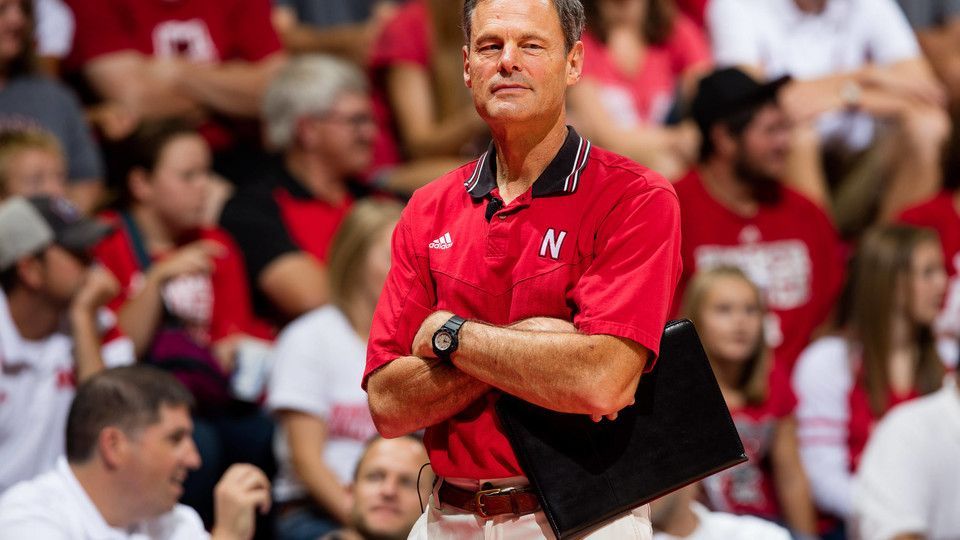
During the Christmas holidays I had the pleasure to get on a video call with coach Cook.
John Cook is the head coach of the Nebraska Huskers volleyball program. Under John's guidance the Huskers went on to grab 4 National Championships. This current season is his 21st straight season at Nebraska.
I hope you enjoy his answers below, there is something in there for everybody.
Why did you decide to commit to become a professional volleyball coach? What pushed you towards that decision?
So for me, I grew up in California, Southern California, I did not play volleyball. I was actually becoming a teacher, and was coaching high school football(American Football).
Back then you had to first become a substitute teacher to get into a school, or a school district to even be eligible to get a full time schedule as a teacher. I was a substitute for three years just trying to get in.
Finally a school hired me. But there was one caveat. In the 80's, women's sports were just starting to take off so they were looking for people to coach women's sports.
Let me be clear. I did not want to coach women's sports. (laughs)
The school told me: ‘you're going to coach women's volleyball, women's basketball and women's track’. I didn't know any rules about volleyball at that time. But I took the job to get a contract, while thinking the whole time as soon as I could, I would get back into coaching football.
I do believe that fortunately sometimes the stars just line up. All this happened in San Diego, California, and at that time the USA teams were based close by. And the top club program in the country for boys and girls was also nearby, just 90 minutes North of San Diego. It was a club called Orange County ran by Charlie Brande.
I started to go up there and watched him practice. I would also go to the USA practices with Doug Beal, Bill Neville and Terry Liskevych.
That’s what I meant with the stars lining up. It was a great learning environment for me to be in and start coaching volleyball.
My initial coaching style? Well, I just coached those young ladies like football players. Which was very tough. I really wanted to teach them how to compete, this was all new to them. I can tell you there was a lot of crying, a lot of emotion.
We just trained fundamentals and we trained really hard. I did beach runs with them, really tough six mile beach runs, just trying to toughen them up. And all of a sudden, we're winning. (laughs) Both the focus on the fundamentals and the mental fortitude really gave us an edge over any other team in the San Diego area.
And that's how my career took off.
For sure I’ve had to make a lot of adjustments over time to develop my current opinions and ideas about training and coaching volleyball.
The focus on the fundamentals of course has stayed.
I really made a series of steps from high school to college to USA Men in the Olympics, back into Division One college volleyball.
And of course, I'm in Nebraska now, this will be my 21st year coming up.
That period in time, your location and the focus on the toughness, that screams ‘Arie Selinger’ to me.
Arie’s book was the first volleyball book that I read. It had a lot of science in it (for that time) a lot of analytics and studies of arms swings et cetera. It was very interesting.
I remember going to a clinic that Arie did with the USA women's team. I remember seeing these women move, how they went to the floor, the tempo they played. Of course they were a great team (winning the Silver medal in the 1984 Olympics in Los Angeles) but I was still really blown away by what these players could do.
So that pushed my expectations even higher. I really had high expectations for my own team.
So again, I was in a hotbed for volleyball as a developing volleyball coach. You can for sure say that I was very lucky.
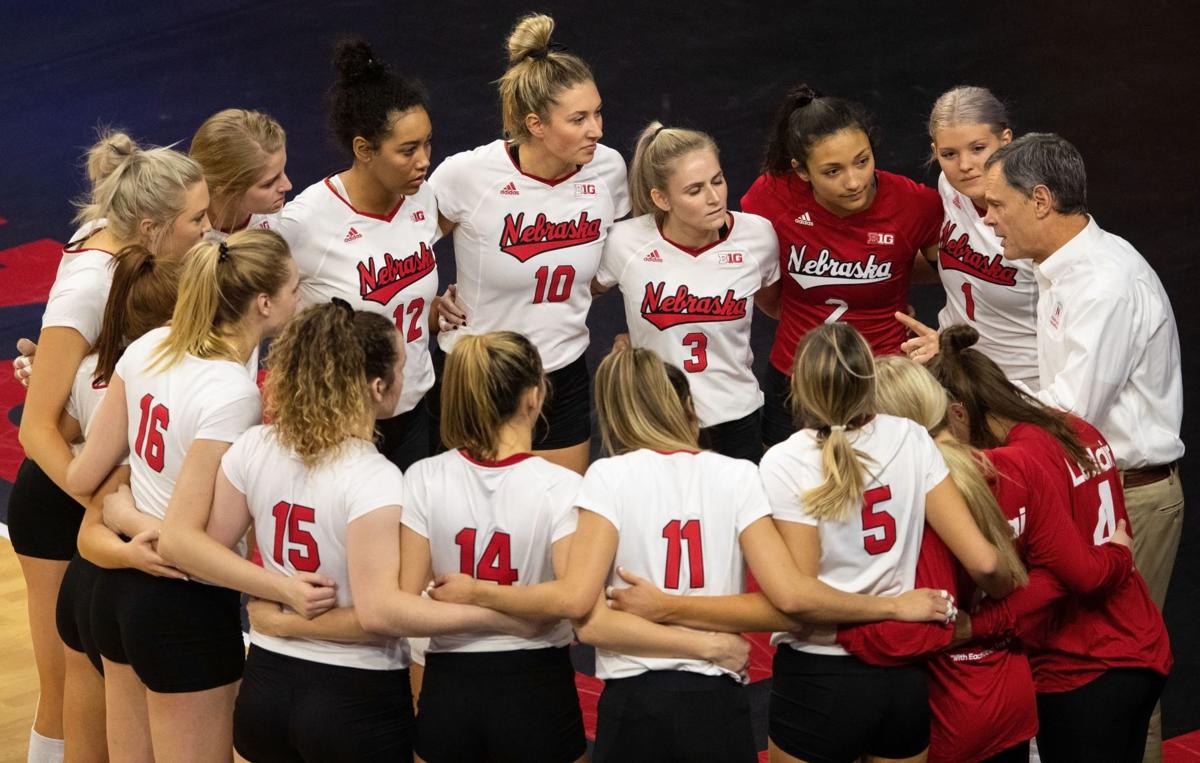
What advice would you give yourself as a starting coach? An advice that is so clear and logical for you now, but that you had to develop over the years. (Can be about anything)
To be a lifelong learner. I just signed up for an online course platform about sport psychology, I just ordered two new books. One about how to understand and coach our current generation of players and then another book about mental performance. I'm constantly studying, reading, learning, you just have to as a coach.
That would be my advice, to be a lifelong learner. And the story I always tell is that during my first year at Nebraska(in 2001), we went undefeated and won a national championship. So I thought, okay, I got this figured out, this is pretty easy.
I can tell you now, 20 years later, there's days I go into that gym, and I'm like, I'm not sure about this, is this the right thing? Or, am I saying the right thing? Are we training the right way?
So really, never stop learning, that is key. It doesn't matter exactly what it is, but keep on doing it.
And there's so many ways to learn now, books, courses over Zoom, other webcasts, you name it.
I signed up for the AVCA webcast. I've listened to Luka (Slabe - Luka's interview is coming up in a few weeks), I listened to Hugh (McCutcheon). My entire staff is doing this also. Maybe there are a couple things we pick up that's going to help make us better.
That’s why we need to do it. We need to do it for ourselves, but most of all for our team.
Do you have a particular goal as a coach? Maybe a goal that you already reached or a goal that is so hard to reach that it gives you daily motivation?
I have several goals. For my team, I want to ‘max out’. I really want to have the whole team performance be better than the sum of all parts.
Looking back, my greatest performing teams did not win a national championship, but they ‘maxed out’ to their full potential. And that's when I get the most satisfaction out of coaching.
My second goal is to be a better version of myself every year. That's making sure I'm working out, that I'm learning, that I'm working on my mindset. Really trying to be the best version of myself to lead our program.
Another goal is to make sure that at the end of the year, we don't have any regrets. Did we do everything possible to be the best we could be? As a head coach, I'm looking over the entire program, is there something I wish we would have done better or I wish I'd said something sooner. I’m responsible for turning every possible stone over to be the best we can be.
And then I think the other goal is what I've learned in the last, I'd say 10 years, is figuring out how to build relationships with our players.
I think that is very, very important, and again, I came from a coaching background where it didn't matter whether you cared about your players, you talked to them or not.
With this generation of players we are coaching, if I'm going to push them to the limit, and ask them to try to go to another level, there has to be a level of trust there and some kind of relationship.
And this also goes for our staff. The coaches, our director of Ops, and our grad managers, everybody that is part of our program. I really want to be building those relationships.
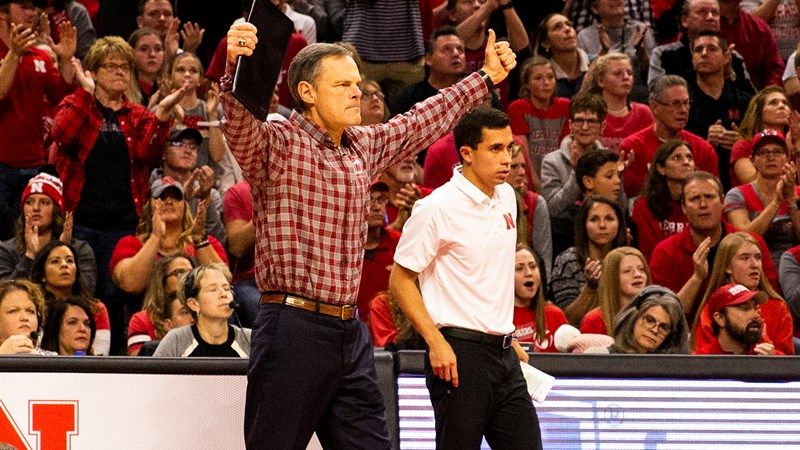
I’m sure you’ll have some sort of feedback mechanism that you use. Could you elaborate on that?
Well, there's two things.
One: every day, after practice, we debrief as a staff. We come together, we talk about everything, and everybody has a voice.
In my early years of coaching, I used to do it all by myself. Now I really rely on my staff, and I've got great assistant coaches. The coaches that have come through here are mostly not here for a very long time as they're getting hired to be head coaches or get other interesting offers, to me that is a sign that we do a good job getting them to that level.
I really trust my staff, I listen to them, we discuss all sorts of things. We really enjoy those moments and sometimes it'll go on and on, we'll sit here for two hours.
Two: the ‘eye test’. As I’ve gotten more experience, I watch how our team plays and how they interact. I need to know where this team is, are they playing well together, are they playing with each other or for each other. You can't measure that. And it's not always measured in wins and losses. But it's a feel of how the team plays.
I know your home games have been sold out since 2001, a long stretch like that must for sure mean that the crowd really enjoys the volleyball that Nebraska brings.
It’s for sure something we talk about with our players. We have a responsibility to inspire the people that pay money to come in here.
It's expensive to get a ticket. And right now there are over 1000 people on the waiting list to buy a season ticket. We really tell the players that the crowd wants to see you play inspired and play as a team.
The crowd is good with winning and losing as long as they feel that the team went all out.
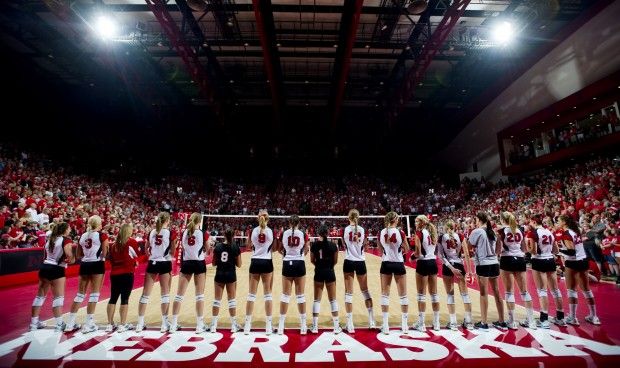
The future of volleyball, how will the game evolve according to your opinion?
We spent a lot of time watching how the men play. Everybody will say the men's Olympics is much more competitive, top to bottom than the women's side. We feel like the men’s game is evolving quicker than the women’s game. I really believe that a highly competitive environment creates creativity and breeds progress.
In America, a lot of the colleges are kind of doing the same thing. In the end we are copying each other. I feel that there is a lot to learn from the men’s game and that we can get a competitive edge from that.
Already 20 years ago we had great women’s teams, but there were only a handful of really good teams. There was a substantial gap between the top and the bottom.
I think now you're seeing 25 teams that can potentially get to the final four, so the overall level is getting better. And that's forcing coaches to evolve and figure out how they're going to keep up and try to get ahead of some of these teams.
So just putting the focus on doing what we’ve been doing or what other women’s teams are doing won’t cut it.
What rule change is necessary in the future? And why would you want to see this new rule implemented?
The rule that I would change in America, we wouldn't have to change this in Europe, is the use of substitutions. We have the availability of 15 subs plus a libero per game.
I would immediately change to international sub rules. The only reason it exists, I guess, is to get more people in a match. I just think it really, really hurts American women’s volleyball.
It's hard to find great passers, right now if you're tall in club volleyball in high school, you don't play back row because probably you're not coordinated enough yet, you'll just get subbed out. Which means that you can’t develop.
But we know physicality is really important and on an international level even more so. What you get is that our physically gifted players don’t get the chance to develop their back court game.
Men's volleyball in the US plays by the International sub rules, so they really develop outside hitters to become very good passers. We, the women’s side, we became too specialized.
Not having this rule I think it would help coaches become better coaches and you would have to develop everybody to be an all round volleyball player, starting already at the younger ages. So I applaud European and international volleyball for doing that and I think it makes it hard for America to develop a lot of champion all round players.
(‘We get players that come to Nebraska who have never served in a match. Never.')
This rule chance would really help the sport and help develop better volleyball players and make it more fun for everybody. Not becoming that specialized at an early age will probably reduce a lot of overuse injuries also.
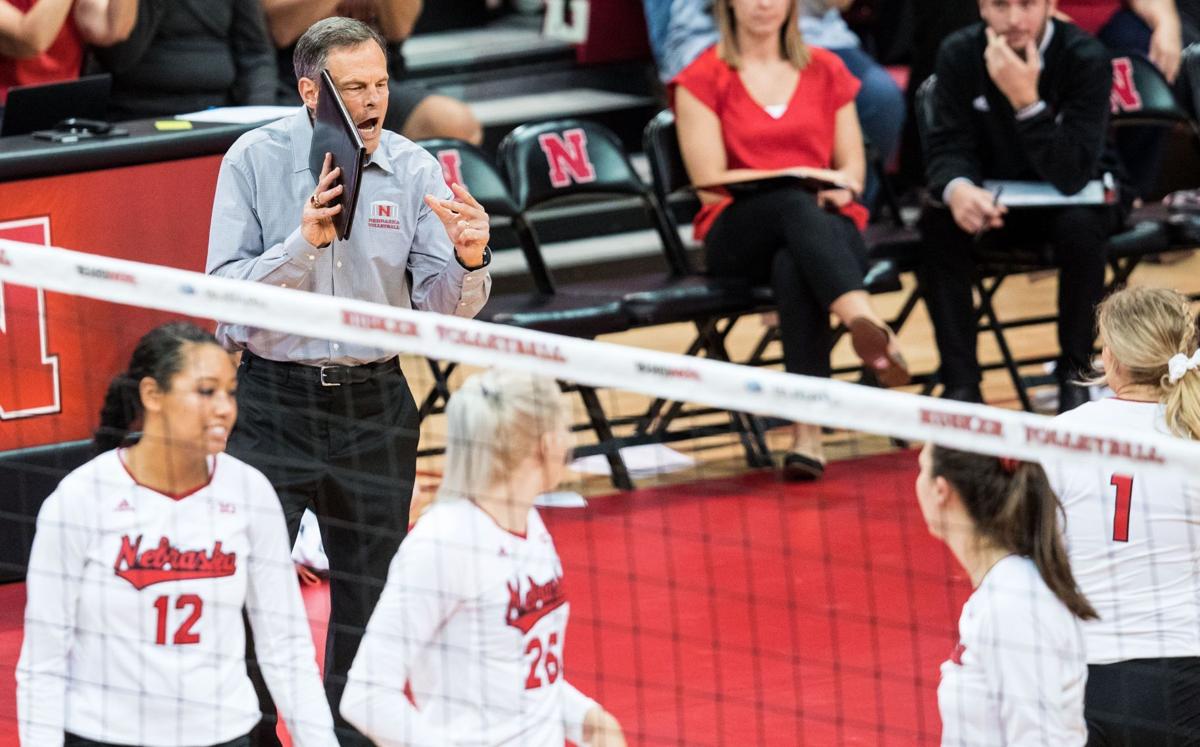
Why not ask a silly question also, we had so many serious ones. :-) So, you are Dr. Frankenstein and have the ability to put together the world's most performing volleyball player. Which at least 5 characteristics would he/she have.
We were actually talking about this the other day with my staff. When I look back at all the players, and I've coached men and women so I have a general overview of all the talent, I think the best all round player must have been Jeff Stork.
He was setting for the USA team for a couple Olympics (won Olympic Gold in the Seoul Olympics in 1988, Bronze in Barcelona 1992)
First of all, I think he could have played any professional sport. That's how good of an athlete he was. He was left handed, which gave him an advantage as a setter, he could probably have hit internationally also. He was 6ft5 or 198cm, so he was a good blocker. But he was also a great defensive player. He had a great serve. He did everything.
The most important thing however, he was really competitive and really tough. He played with Karch, Ctvrtlik, Timmons and that entire generation, he was able to lead those talented players and in the meantime control all those egos.
So to me he had these four of five important assets. The four things are lefty, athletic, perfect size. And this lethal arm for serving, taking on the second ball, or even hitting a high ball if needed.
But the fifth one is the mental part. To be a leader, making a great team out of all these great players and just understanding the game. He was a very intelligent player.
And he just had that great vision of what was going on and understanding what was coming up.
If you look at the great American athletes, Michael Jordan, Tom Brady, Wayne Gretzky well they see things differently than other athletes. Stork is one of those guys.
Best game you've ever seen. Very simply, what recent or game from the volleyball vaults did validate once more that volleyball is the greatest sport on the globe.
I got 2 answers. On an international level, the 2012 London Olympic Final is one of the greatest men's matches I've ever seen. Russia being 0-2 down in sets against Brazil. The Russian head coach switched Muserskiy from the middle to the opposite position, well that was one of the gutsiest coaching moves ever.
Making that decision, coming back and going on to win the Olympic Gold in 5 sets. Doing all that AND being on the biggest stage possible, that must be one of the greatest men's matches I've ever seen.
In college, the greatest match for me was Nebraska playing Penn State in the 2008 final four. We had Jordan Larson and nobody else. (laughs)
Just even getting to the Final Four was a major, major accomplishment. Penn State had not lost a set that entire year.
In that game we went head to head till 10-10 in the fifth in front of 18,000 people in Omaha, Nebraska. It was the loudest match I've ever been part of and probably one of the greatest sporting events I've ever witnessed. Penn State ended up winning that game. But just the fact that it went down to that.
It really cemented Jordan Larson's legacy as one of the greatest USA female volleyball players ever. And I think if you ask coach Rose of Penn State which was his favorite game he’ll probably give the exact same answer.
That 2008 Nebraska team played better than their dreams.
I won’t get into every background story that went on in that season. But there were so many things that went on, due to injuries that season at certain times there were 3 walk on players on the court.
Jordan's mom was going through cancer treatment. There were just so many things that were pulling all that together that it was just incredible.
And that Penn State team was, there's no question in my mind, the greatest volleyball team ever in American college volleyball, nobody can deny that. They had four future Olympians Megan Hodge, Christa Harmotto, Alisha Glass and Nicole Fawcett on that team.
The only two sets they lost in that entire season was that match and they went on the next night and won 3-0 to Stanford.
